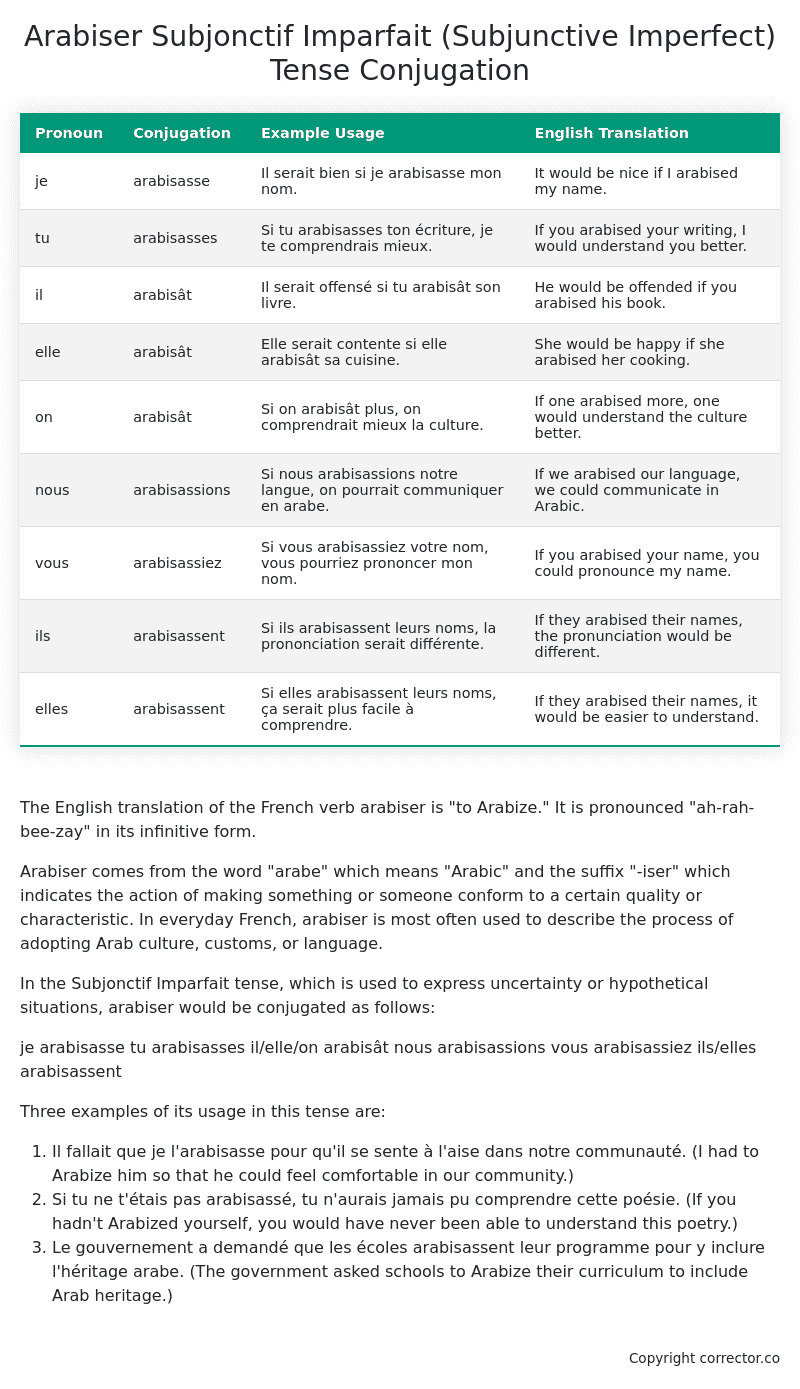Subjonctif Imparfait (Subjunctive Imperfect) Tense Conjugation of the French Verb arabiser
Introduction to the verb arabiser
The English translation of the French verb arabiser is “to Arabize.” It is pronounced “ah-rah-bee-zay” in its infinitive form.
Arabiser comes from the word “arabe” which means “Arabic” and the suffix “-iser” which indicates the action of making something or someone conform to a certain quality or characteristic. In everyday French, arabiser is most often used to describe the process of adopting Arab culture, customs, or language.
In the Subjonctif Imparfait tense, which is used to express uncertainty or hypothetical situations, arabiser would be conjugated as follows:
je arabisasse
tu arabisasses
il/elle/on arabisât
nous arabisassions
vous arabisassiez
ils/elles arabisassent
Three examples of its usage in this tense are:
- Il fallait que je l’arabisasse pour qu’il se sente à l’aise dans notre communauté. (I had to Arabize him so that he could feel comfortable in our community.)
- Si tu ne t’étais pas arabisassé, tu n’aurais jamais pu comprendre cette poésie. (If you hadn’t Arabized yourself, you would have never been able to understand this poetry.)
- Le gouvernement a demandé que les écoles arabisassent leur programme pour y inclure l’héritage arabe. (The government asked schools to Arabize their curriculum to include Arab heritage.)
Table of the Subjonctif Imparfait (Subjunctive Imperfect) Tense Conjugation of arabiser
| Pronoun | Conjugation | Example Usage | English Translation |
|---|---|---|---|
| je | arabisasse | Il serait bien si je arabisasse mon nom. | It would be nice if I arabised my name. |
| tu | arabisasses | Si tu arabisasses ton écriture, je te comprendrais mieux. | If you arabised your writing, I would understand you better. |
| il | arabisât | Il serait offensé si tu arabisât son livre. | He would be offended if you arabised his book. |
| elle | arabisât | Elle serait contente si elle arabisât sa cuisine. | She would be happy if she arabised her cooking. |
| on | arabisât | Si on arabisât plus, on comprendrait mieux la culture. | If one arabised more, one would understand the culture better. |
| nous | arabisassions | Si nous arabisassions notre langue, on pourrait communiquer en arabe. | If we arabised our language, we could communicate in Arabic. |
| vous | arabisassiez | Si vous arabisassiez votre nom, vous pourriez prononcer mon nom. | If you arabised your name, you could pronounce my name. |
| ils | arabisassent | Si ils arabisassent leurs noms, la prononciation serait différente. | If they arabised their names, the pronunciation would be different. |
| elles | arabisassent | Si elles arabisassent leurs noms, ça serait plus facile à comprendre. | If they arabised their names, it would be easier to understand. |
Other Conjugations for Arabiser.
Le Present (Present Tense) Conjugation of the French Verb arabiser
Imparfait (Imperfect) Tense Conjugation of the French Verb arabiser
Passé Simple (Simple Past) Tense Conjugation of the French Verb arabiser
Passé Composé (Present Perfect) Tense Conjugation of the French Verb arabiser
Futur Simple (Simple Future) Tense Conjugation of the French Verb arabiser
Futur Proche (Near Future) Tense Conjugation of the French Verb arabiser
Plus-que-parfait (Pluperfect) Tense Conjugation of the French Verb arabiser
Passé Antérieur (Past Anterior) Tense Conjugation of the French Verb arabiser
Futur Antérieur (Future Anterior) Tense Conjugation of the French Verb arabiser
Subjonctif Présent (Subjunctive Present) Tense Conjugation of the French Verb arabiser
Subjonctif Passé (Subjunctive Past) Tense Conjugation of the French Verb arabiser
Subjonctif Imparfait (Subjunctive Imperfect) Tense Conjugation of the French Verb arabiser (this article)
Subjonctif Plus-que-parfait (Subjunctive Pluperfect) Tense Conjugation of the French Verb arabiser
Conditionnel Présent (Conditional Present) Tense Conjugation of the French Verb arabiser
Conditionnel Passé (Conditional Past) Tense Conjugation of the French Verb arabiser
L’impératif Présent (Imperative Present) Tense Conjugation of the French Verb arabiser
L’infinitif Présent (Infinitive Present) Tense Conjugation of the French Verb arabiser
Struggling with French verbs or the language in general? Why not use our free French Grammar Checker – no registration required!
Get a FREE Download Study Sheet of this Conjugation 🔥
Simply right click the image below, click “save image” and get your free reference for the arabiser Subjonctif Imparfait tense conjugation!

Arabiser – About the French Subjonctif Imparfait (Subjunctive Imperfect) Tense
Formation
Common Everyday Usage Patterns
Interactions with Other Tenses
Subjonctif Présent
Indicatif Passé Composé
Conditional
Conditional Perfect
Summary
I hope you enjoyed this article on the verb arabiser. Still in a learning mood? Check out another TOTALLY random French verb conjugation!


